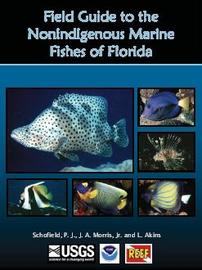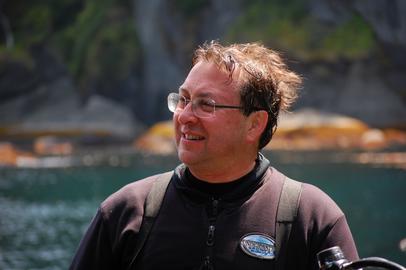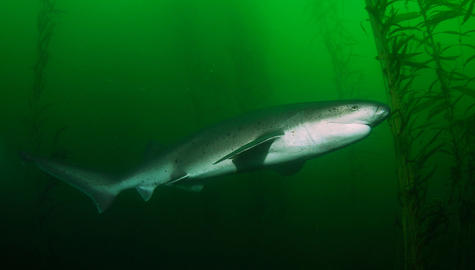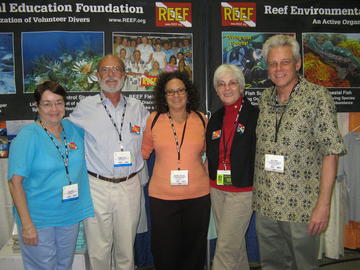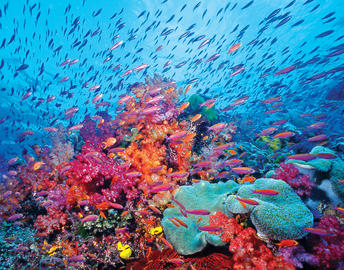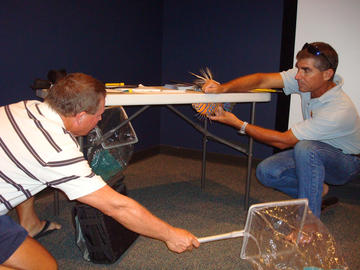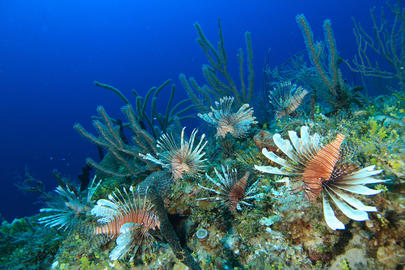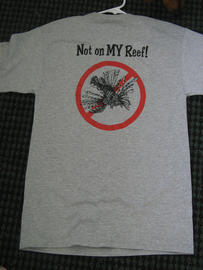Working in close partnership, REEF, NOAA, and the USGS, have just completed the first field guide to non-native fishes in Florida. The 120 page publication documents the occurrences, identification and ecology of more than 35 non-native fish species found in Florida waters. Detailed sightings maps, notes on similar appearing species and information on native ranges are included. The goal of the publication is to provide a single source, field ready guide for enforcement as well as a reference for researchers and educators to aid in early detection and removal of non-native marine fish.
REEF proudly awards our 2009 Volunteer of the Year award to David Jennings, a dedicated REEF surveyor and ambassador. David has been a member of REEF since 2006. He has conducted 154 REEF surveys and he is a member of the Pacific Advanced Assessment Team (AAT).
Wow, what a year. Despite some challenges, it is wonderful to reflect on the successes that REEF achieved in 2009. I have served REEF as Director of Science for 10 years now, and before that was involved as a volunteer, and I am proud to be a part of such an amazing and active organization.
REEF is working in close partnership with the Florida Keys National Marine Sanctuary (FKNMS) to diligently track lionfish reports and initiate removal efforts in South Florida. The first confirmed lionfish in the Florida Keys was reported and captured within 24 hours in January 2009 (see previous enews article). Subsequent early reports in March-June were met with successful rapid response.
Active REEF surveyor, Mike Bear, and other San Diego area divers started noticing something unexpected earlier this year -- increasing numbers of encounters with the Bluntnose Sevengill Shark, Notorynchus cepedianus, also known as the Broadnose Sevengill shark. Knowing first hand the impact that divers and snorkelers can have as citizen scientists, Mike set up a website - http://sevengillsharksightings.org -- to serve as a central repository for photographic, videographic and written data on these magnificent creatures.
Once again, REEF participated in the dive industry show, DEMA. We showed off all of the cool REEF gear, including our new lionfish t-shirts, which were a hit, as well as all of the REEF survey essentials. We also spoke with many dive instructors who were looking for new types of classes to teach. The REEF Fish ID curricula certainly fit the bill. A lot of networking was done and new friends made. And lots of people signed up for a free REEF membership.
As another amazing year draws to a close, we are reaching out to our valued members to contribute financially. REEF is a member-driven organization that is focused on the conservation of our world's ocean environments. The key to our 20-year success story is a close partnership between our volunteers, contributors, and staff, who share both an affinity for marine wildlife and a commitment to its sustainability. As never before, we are counting on your tax-deductible financial support, which is the cornerstone of our grass-roots efforts to protect the marine environment.
REEF is working in close partnership with the Florida Keys National Marine Sanctuary (FKNMS) to diligently track lionfish reports and initiate removal efforts in South Florida. The first confirmed lionfish in the Florida Keys was reported and captured within 24 hours in January 2009 (see previous enews article). Subsequent early reports in March-June were met with successful rapid response.
REEF is continuing our ground-breaking research and outreach on the lionfish invasion with projects in Puerto Rico and the US Virgin Islands. The project is supported with funding from the NOAA Coral Reef Conservation Grant and the Buck Island REEF National Park and long-time supporters Henry Foundation, Oceans Foundation and Munson Foundation.

